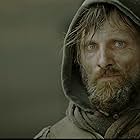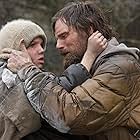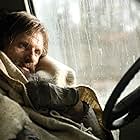In a dangerous post-apocalyptic world, an ailing father defends his son as they slowly travel to the sea.In a dangerous post-apocalyptic world, an ailing father defends his son as they slowly travel to the sea.In a dangerous post-apocalyptic world, an ailing father defends his son as they slowly travel to the sea.
- Nominated for 1 BAFTA Award
- 5 wins & 34 nominations total
Jeremy Ambler
- Man In Cellar #1
- (uncredited)
Aaron Bernard
- Militant
- (uncredited)
- Director
- Writers
- All cast & crew
- Production, box office & more at IMDbPro
Storyline
Did you know
- TriviaTo live the role, Viggo Mortensen would sleep in his clothes and deliberately starve himself. At one point, he was thrown out of a shop in Pittsburgh, because they thought he was a homeless man.
- GoofsThe "current" portion of the movie takes place approximately 7-8 years after the "disaster" happened that caused all plant life to die off. If all plant life had died off, there would be no dry grass shooting from the soil, nor dead grass lying on the ground especially with all the weather turmoil happening around. All leaves and dried grass would have decomposed in that amount of time. Furthermore, trees would not have dried leaves hanging from the branches.
- Crazy creditsOver the end credits, we hear the sounds of children playing. What the world must have been like in happier times.
- ConnectionsFeatured in At the Movies: Venice Film Festival 2009 (2009)
- SoundtracksSonata for Violin and Harpsichord No. 3 in E Major: Adagio Ma Non Tanto
Written by Johann Sebastian Bach (as J.S. Bach)
Arranged by Ryan Franks
Performed by Ryan Franks & Harry Scorzo
Courtesy of Crucial Music Corporation
Featured review
So Well Done I Wanted To Kill Myself
The Road (1:50, R) — Science Fiction, 3rd string, original
Among the first words spoken in The Road (adapted from Cormac McCarthy's novel) are "It's just another earthquake.". That's supposed to be reassuring.
It's a bleak, devastated, post-apocalyptic world leached of everything: color, sounds, names, sunshine, warmth, joy, hope. Thru it trudge The Man (Viggo Mortenson) and The Boy (Kodi Smit-McPhee), slowly and painfully making their way to "the coast", where maybe things will be marginally better. Who can say? But what else is there?
Along the way they encounter The Gang Member (Garret Dillahunt, still as creepy and frightening as he was in The Sarah Connor Chronicles and The Last House on the Left), The Road Gang Leader (Brenna Roth), The Old Man (Robert Duvall), The Thief (Michael K. Williams), and The Veteran (Guy Pearce) and his woman (Molly Parker). In flashbacks to an achingly lost former life, we see The Wife (Charlize Theron).
And really, once you've named the names, you've pretty well covered the movie. The name of the game is Survival, tho none can say what the point of it is. The food is gone, and clearly no more will be growing. Humans are apparently the only animals to survive the unnamed global disaster, so they represent the sole remaining, rapidly dwindling source of protein. The voices you hear approaching are not the Red Cross.
Some choose not to play. The Wife, after some low-energy soul-searching, goes the ancient-Eskimo route. "She was gone," The Man remembers, "and the coldness of it was her final gift."
Others persevere for no cogent reason. "DId you ever wish you would die?", The Man asks. "No," The Old Man replies, "it's foolish to ask for luxuries in times like these."
The Man and The Boy have 1 gun with 2 bullets left; they are not being reserved for potential assailants. In some of the movie's most agonizing scenes, we see The Man explain not only what must be done but why.
I walked into this movie 10 hours after leaving the theater where Avatar splashed the screen with color, motion, activity, purpose, a 3rd dimension, and a superb sound track. It is difficult to imagine 2 more disparate films in terms of tone and atmosphere. But both are extremely effective at making their respective worlds seem completely real.
The movie is unremittingly grim and completely believable. It doesn't pull its punches or sell out. It will haunt you. It's unlikely that anyone else will ever make another movie that treats the end of the world so realistically, so if you want to see the standard against which all others will be compared, this is your chance.
Stay away if you're depressed or prone to it, and avoid razor blades for 12 hours afterward.
Among the first words spoken in The Road (adapted from Cormac McCarthy's novel) are "It's just another earthquake.". That's supposed to be reassuring.
It's a bleak, devastated, post-apocalyptic world leached of everything: color, sounds, names, sunshine, warmth, joy, hope. Thru it trudge The Man (Viggo Mortenson) and The Boy (Kodi Smit-McPhee), slowly and painfully making their way to "the coast", where maybe things will be marginally better. Who can say? But what else is there?
Along the way they encounter The Gang Member (Garret Dillahunt, still as creepy and frightening as he was in The Sarah Connor Chronicles and The Last House on the Left), The Road Gang Leader (Brenna Roth), The Old Man (Robert Duvall), The Thief (Michael K. Williams), and The Veteran (Guy Pearce) and his woman (Molly Parker). In flashbacks to an achingly lost former life, we see The Wife (Charlize Theron).
And really, once you've named the names, you've pretty well covered the movie. The name of the game is Survival, tho none can say what the point of it is. The food is gone, and clearly no more will be growing. Humans are apparently the only animals to survive the unnamed global disaster, so they represent the sole remaining, rapidly dwindling source of protein. The voices you hear approaching are not the Red Cross.
Some choose not to play. The Wife, after some low-energy soul-searching, goes the ancient-Eskimo route. "She was gone," The Man remembers, "and the coldness of it was her final gift."
Others persevere for no cogent reason. "DId you ever wish you would die?", The Man asks. "No," The Old Man replies, "it's foolish to ask for luxuries in times like these."
The Man and The Boy have 1 gun with 2 bullets left; they are not being reserved for potential assailants. In some of the movie's most agonizing scenes, we see The Man explain not only what must be done but why.
I walked into this movie 10 hours after leaving the theater where Avatar splashed the screen with color, motion, activity, purpose, a 3rd dimension, and a superb sound track. It is difficult to imagine 2 more disparate films in terms of tone and atmosphere. But both are extremely effective at making their respective worlds seem completely real.
The movie is unremittingly grim and completely believable. It doesn't pull its punches or sell out. It will haunt you. It's unlikely that anyone else will ever make another movie that treats the end of the world so realistically, so if you want to see the standard against which all others will be compared, this is your chance.
Stay away if you're depressed or prone to it, and avoid razor blades for 12 hours afterward.
helpful•17331
- RichardSRussell-1
- Dec 18, 2009
Details
Box office
- Budget
- $25,000,000 (estimated)
- Gross US & Canada
- $8,117,000
- Opening weekend US & Canada
- $1,502,231
- Nov 29, 2009
- Gross worldwide
- $27,639,579
- Runtime1 hour 51 minutes
- Color
- Sound mix
- Aspect ratio
- 2.35 : 1
Contribute to this page
Suggest an edit or add missing content


















































